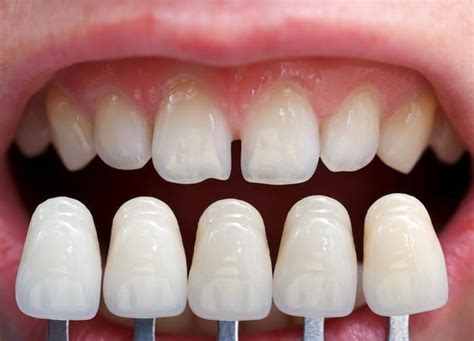Difference Between Dentures And Veneers

When it comes to restoring or enhancing the appearance of teeth, two popular options often considered are dentures and veneers. While both can significantly improve the aesthetic and functional aspects of one’s smile, they serve different purposes and are suited for different needs. Understanding the distinction between dentures and veneers is crucial for making an informed decision about which option is best for your oral health and cosmetic goals.
Purpose and Function
Dentures: These are removable appliances designed to replace missing teeth. They can be partial, replacing a few teeth, or complete, replacing all teeth in the upper or lower jaw. Dentures are not only aesthetically pleasing but also functional, allowing individuals to eat, speak, and smile with confidence. They are a cost-effective solution for tooth loss and can be adjusted or remade as the mouth changes over time.
Veneers: Veneers are thin layers of porcelain or composite material bonded to the front of teeth to improve their appearance. They are primarily used for cosmetic purposes, such as correcting discoloration, altering the shape of teeth, or closing gaps between teeth. Veneers are a more conservative approach than dentures since they only cover the front of the teeth, leaving the rest of the tooth structure intact.
Procedure and Placement
Dentures: The process of getting dentures involves several steps, starting with an initial consultation to assess the need for dentures. Impressions of the mouth are taken to create a model, which is then used to fabricate the dentures. After the dentures are made, they are fitted and adjusted to ensure proper fit and comfort. It may take a few appointments to achieve the perfect fit, as the dentures need to be comfortable and functional.
Veneers: The procedure for veneers typically requires three trips to the dentist: one for consultation and planning, another for preparation and impression taking, and a final visit for bonding. During the preparation phase, a small amount of enamel is removed from the front of the teeth to make room for the veneers. Impressions are taken and sent to a dental laboratory for veneer fabrication. Once ready, the veneers are bonded to the teeth using a special cement.
Durability and Maintenance
Dentures: With proper care, dentures can last for many years. However, they may need to be relined, rebased, or remade due to natural changes in the gums and bone structure. Regular cleaning and maintenance are crucial to prevent stains and bacterial buildup. Dentures should be removed at night and soaked in a cleansing solution.
Veneers: Veneers are known for their durability and can last for 10 to 20 years or more, depending on the material used and oral hygiene practices. They are resistant to stains and can withstand normal chewing forces. However, veneers are not indestructible and can chip or crack if subjected to excessive force, such as biting on hard objects. Regular dental check-ups and good oral hygiene are essential for the longevity of veneers.
Cost Consideration
Dentures: The cost of dentures can vary widely depending on the type (partial or complete), materials used, and the expertise of the dentist. Generally, dentures are more affordable than veneers, especially for those who need to replace multiple teeth.
Veneers: Veneers are considered a cosmetic procedure and can be more expensive than dentures. The cost per tooth can range significantly, depending on the material (porcelain or composite), the dentist’s experience, and the complexity of the case. Insurance coverage for veneers is typically limited since they are viewed as an elective procedure.
Conclusion
In conclusion, while both dentures and veneers can transform one’s smile, they cater to different needs and circumstances. Dentures are a practical solution for tooth loss, offering a functional and aesthetic replacement for missing teeth. Veneers, on the other hand, are ideal for those seeking to enhance the appearance of their natural teeth, addressing issues like discoloration, shape, and gaps. Ultimately, the choice between dentures and veneers should be made after consulting with a dental professional, who can provide personalized advice based on your oral health, budget, and personal preferences.
Frequently Asked Questions

What are the primary differences between dentures and veneers?
+The primary differences lie in their purpose, procedure, and application. Dentures are designed to replace missing teeth, while veneers are used to enhance the appearance of existing teeth. The procedure for dentures involves creating a removable appliance, whereas veneers require bonding a thin layer of material to the front of the teeth.
How long do dentures and veneers last?
+Dentures can last for many years but may require adjustments due to changes in the mouth. Veneers, on the other hand, can last for 10 to 20 years or more with proper care. The longevity of both depends on maintenance, oral hygiene, and the quality of the materials used.
Are dentures or veneers more expensive?
+Generally, veneers are more expensive than dentures, especially when considering the cost per tooth. However, the total cost can vary based on several factors, including the type of materials used, the complexity of the case, and the dentist’s expertise.
Which option is best for someone with several missing teeth?
+Can veneers be used on teeth with significant damage or decay?
+Veneers are best suited for teeth with minor damage or cosmetic issues. For teeth with significant damage or decay, other dental restorations such as crowns might be more appropriate. It’s essential to consult with a dentist to determine the best course of treatment based on the condition of the teeth.

